Choosing a bedroom design
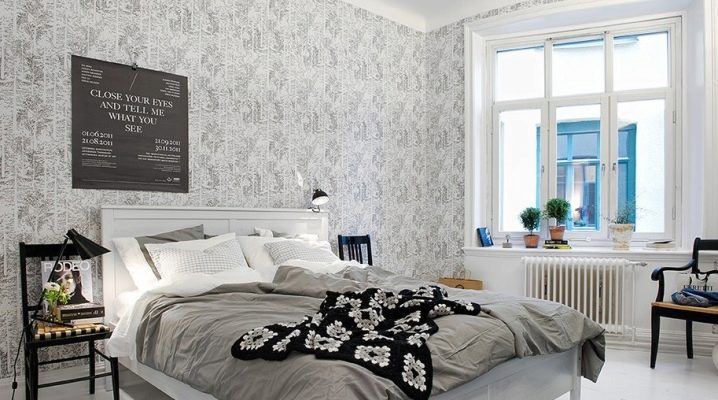
Harmony and comfort are the features of an ideal home, which only those who already have one do not dream of. It is difficult to disagree with the fact that it is more pleasant to cook in the kitchen, equipped with maximum functionality and taste, to receive guests in a luxurious living room, to take care of yourself in a beautiful bathroom. At the same time, the design of the bedroom often fades into the background, since this room is not intended for receiving guests. The bedroom is usually isolated from the rest of the rooms, but its design should at least in little things overlap with the design of the whole house, only then it will be holistic and harmonious.
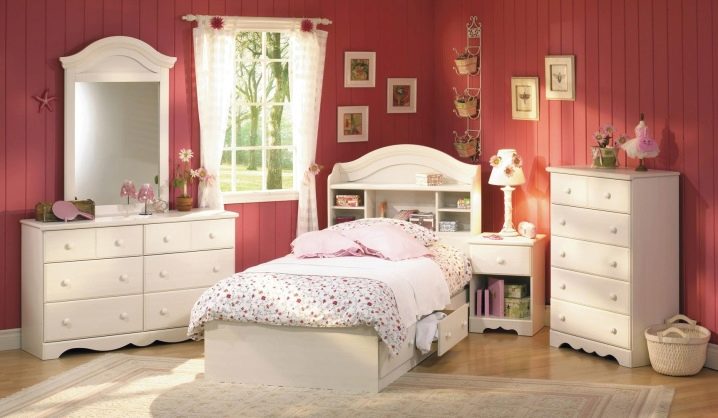
Original solutions
Modern design projects strive to ensure that the bedroom looks fresh, spacious, stylish - and at the same time remains cozy. Some kind of "intimacy" is required, which is conducive to a state of relaxation, and individuality inherent in the intimate zone.
Tightly curtained windows and a double bed in the center of the room, regardless of its size and shape, are relics of the past. Experienced designers advise to experiment with the position of furniture in the room, its shape and dimensions, with accessories and decor.
It is important to be able to take a fresh look at all the flaws in the layout and find application for previously inoperative zones. Maybe it is in them that you can install a corner bookshelf, built-in furniture, open storage systems. Perhaps this impractical alcove at the head of the bed is the perfect place for an electric fireplace.
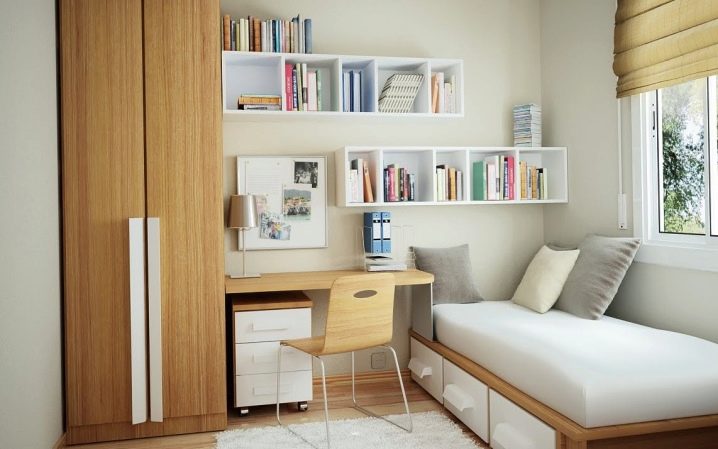
Layout
The shape of the room is very important when choosing style-forming elements.... The rectangular or "pencil-box" shape of the room is a frequent occurrence in Soviet-era buildings. Some of them are so narrow that they resemble second-class carriages, and this does not at all make them convenient for creating an original bedroom design.
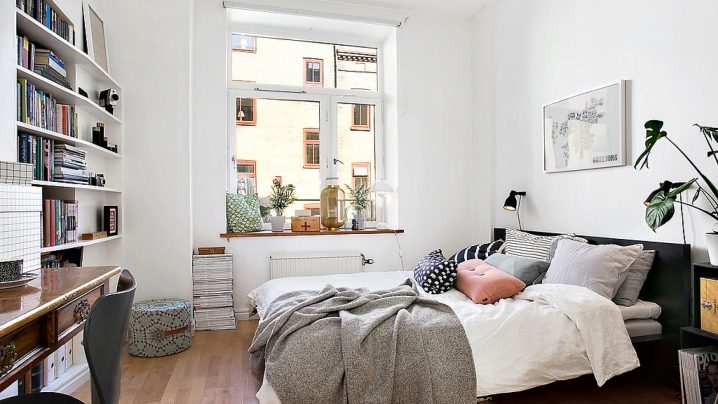
The main purpose of arranging a narrow room is to visually bring its shape closer to the cherished square. It is better not to use only standard methods of expanding the space - like reflective surfaces and light-colored walls. It is worth turning to all the tricks of the designers:
- The correct color combination in the decoration of the walls. Reception is designed for visual expansion of short walls and reduction of long ones. The first shade should be light, it should be placed on the oblong side, and the second should be dark (to highlight the short one).
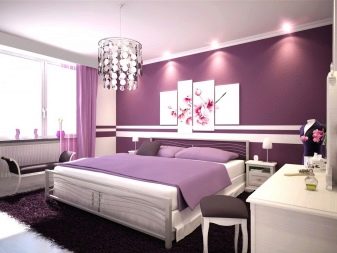
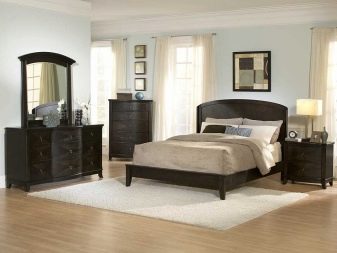
- Photo wallpaper with perspective. The cityscape stretching towards the horizon, the mountain range striving into the distance, and any other images with the most distant background significantly increase the depth of the long wall.
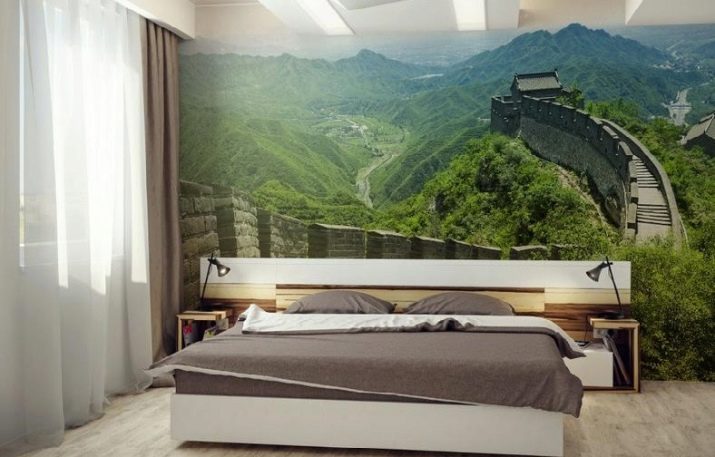
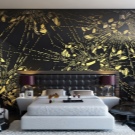
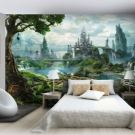
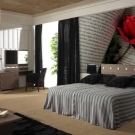
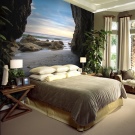
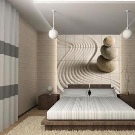
- Window decor. The more natural light in the room, the more spacious it is, so it is better to refuse dense curtains. But light draperies will distract attention from the walls.
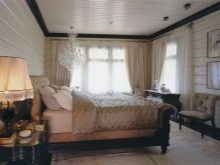
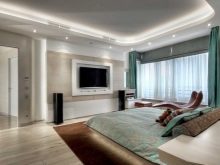
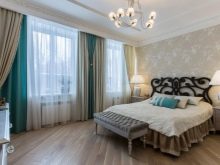
- Correct zoning of the room... Various podiums, compact furniture, bright carpets, mobile partitions - everything that creates multilevel verticals helps to visually transform the "pencil box" space.
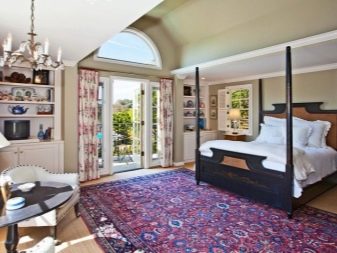
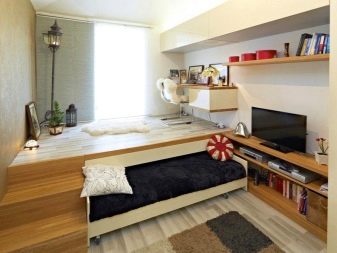
- Niche design. Even a small recess in the longitudinal wall gives dynamics to the environment. You don't need to make it functional, let the niche only work to expand the space.
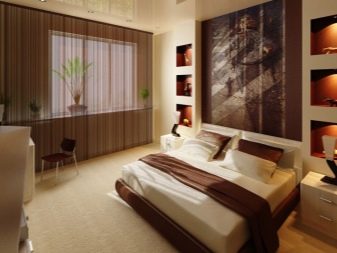
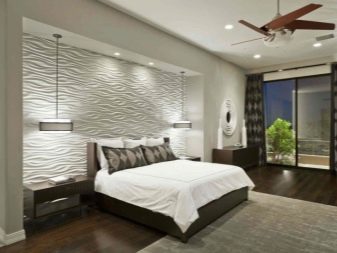
- Large mirrors. A traditional technique that visually enlarges the room by means of a mirrored surface along one of the long walls.
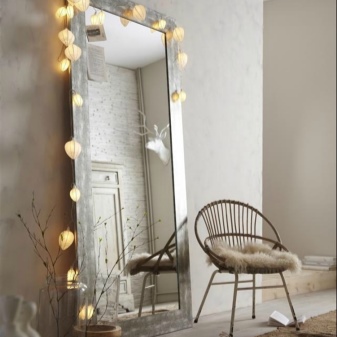
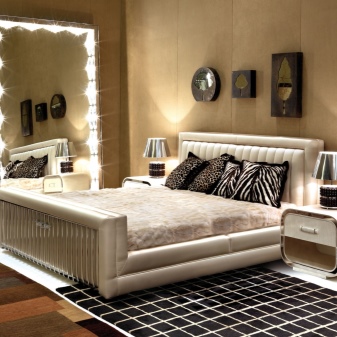
- Horizontal lines. Parquet, laminate, porcelain stoneware, boards - any of these materials on the floor should create a perpendicular with long walls.
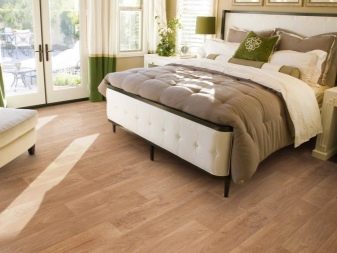
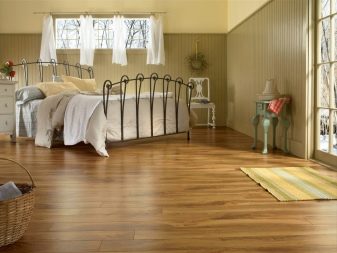
- Smoothing corners. Wall colors, decor, original furniture soften straight lines and help get rid of the compartment effect in narrow rooms.
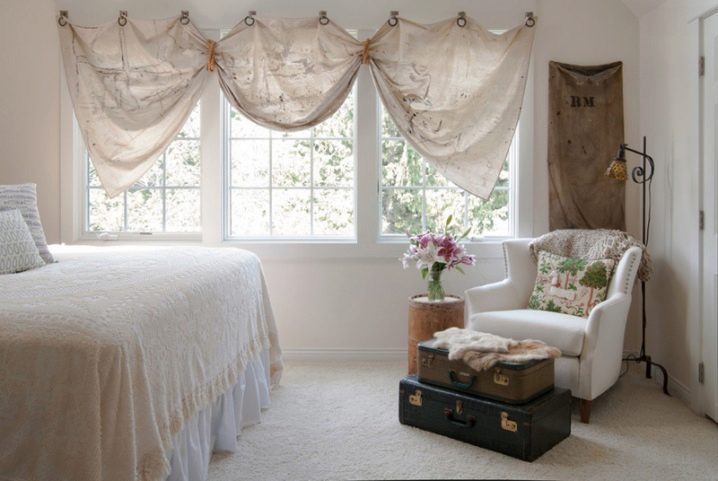
- Minimalist furniture... The less cabinetry in a small room, the better. Long walls provide great opportunities for arranging open shelves on them for storage or mounting built-in wardrobes.
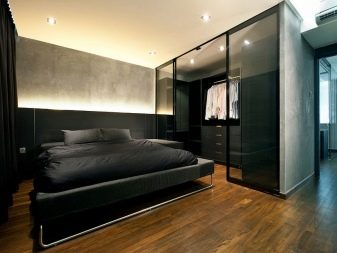
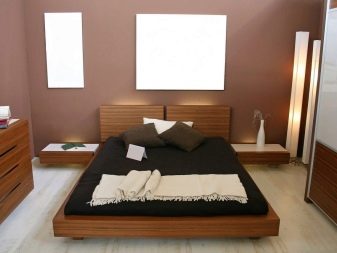
- Artificial lighting. Additional lighting (spots) diversifies the interior and "expands" the walls in a narrow room. The correct placement of light accents simulates natural light, making the room more spacious.
In a room with high ceilings, it is important to use the upper area of the room. Ceiling beams, chandeliers with multi-level lamps, light paper shades and other decor within a specific style can help with this.
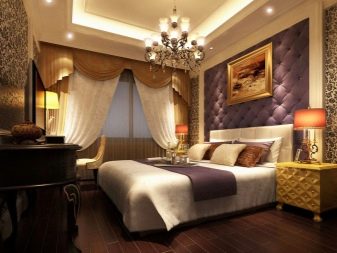
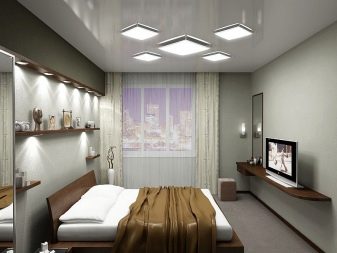
A square or slightly elongated bedroom with one window is the best option in terms of layout. It does not require any special design tricks to visually change the shape, but in a small room, some techniques are necessary:
- Light finish... If in the case of rectangular rooms this is not very effective, then in square rooms it works perfectly. The lighter the decoration of the room, the less visible the boundaries between the walls and the ceiling. The room seems spacious, full of air and light.
- Monochrome. A completely white bedroom will look much larger than it actually is, but it is worth considering the practicality of such an interior and its aesthetic perception.
- Minimalism. The less cluttered the space, the freer it looks. You can optimize the area of a small room with transforming furniture.
- Lack of large drawings on walls and curtains... It is better to replace the curtains themselves with light curtains or blinds, which will not “eat up” an additional 30-40 centimeters of space.
- Smart use of bright accents... A few large attention-grabbing items are always better than a large number of knick-knacks.
- You can also use open shelving, reflective surfaces, lack of clear zoning of the room, diagonal lines on the floor.
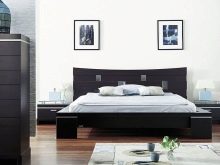
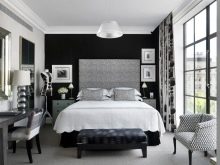
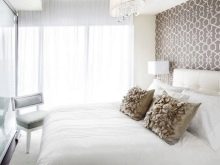
Rooms with a non-standard layout (triangular, trapezoidal, with a sloped ceiling) are the most difficult type to create a design. In an irregularly shaped bedroom, it is very important to turn flaws into advantages, and not try to disguise them in different ways. A bay window can be a great place to read books if the window sill is properly designed, and the columns and arch form the basis for the antique style.
Whatever the unusual shape of the bedroom, it requires accuracy and professionalism in the design.
It is recommended to look at a selection of projects for identical rooms and try to create your own - using computer programs. Ideally, you will need the help of a design professional.

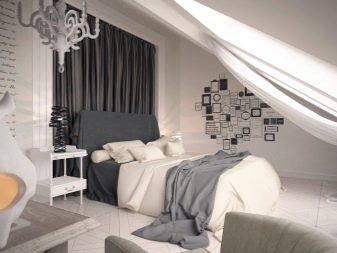
Materials (edit)
Particular attention should be paid to the choice of materials for repair. This choice is directly related to the dominant style direction in the interior of the house. For historical styles, dense wallpaper with a pattern, fabric upholstery, decorative plaster are relevant, and modern trends prefer light negligence and unusual textures.
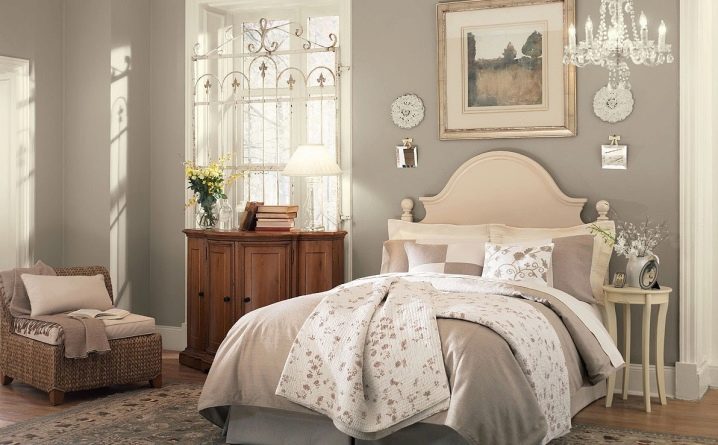
For ceiling
The white ceiling is a classic of the genre in interior design, but other solutions are acceptable in the modern design of bedrooms. The range of building materials is constantly expanding, offering new solutions for the interior. The following types of cladding are popular among designers and repairmen:
Whitewashing or staining. At first glance, it may seem that this is the most economical and easy-to-execute option, but in reality, many unforeseen nuances may appear. The surface for whitewashing or painting must be absolutely flat, therefore it is necessary to seal the seams in advance, treat the ceiling with putty, clean and prime the work surface. The walls, floor and all objects in the room must be packed in construction film so as not to paint anything unnecessary.
The color does not have to be neutral at all, color tints will turn white into any desired shade.
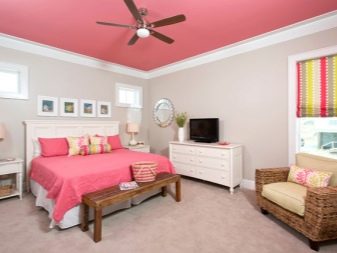
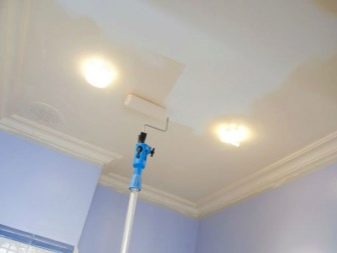
Plaster. Cheap and cheerful, but at the same time practical and aesthetically pleasing. You can plaster the ceiling with your own hands. This material is easy to use, harmless, does not take away precious centimeters from the height of the walls, and does not require cosmetic repairs for a long time.
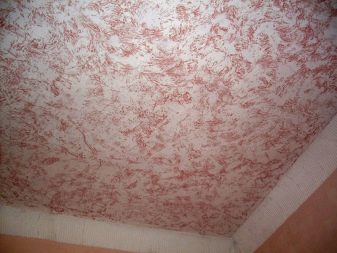
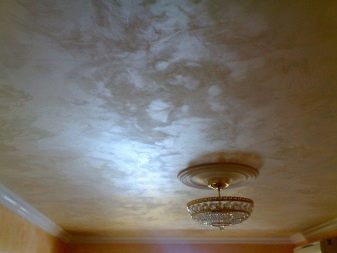
Stretch ceiling. A practical type of cladding, which can be easily mounted and dismantled, helps to hide the wiring, does not require leveling the ceiling surface before installation. Tension structures retain their original appearance for a long time and are easy to clean. With their help, you can create a multi-level structure and play of light in the upper part of the room. The glossy surface reflects natural light, visually expanding the space of the room.
A wide range of color solutions also refers to the advantages of such cladding.
The disadvantages include the fact that additional space is required for the installation of stretch ceilings, and in a small room it may not be available.
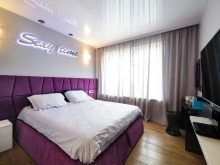
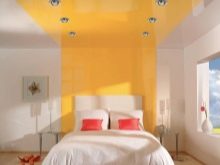
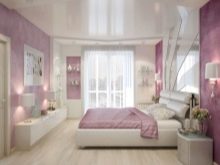
Rack (suspended) covering... Metal slats of various colors are distinguished by good performance and aesthetic properties. With their help, you can create an interesting relief ceiling covering in a room of the correct shape, with beveled corners and other nuances of the layout. They are versatile, practical, environmentally friendly, hide the flaws of uneven surfaces and wiring, are easy to install and disinfect with ordinary detergents.
When choosing slats for decorating the ceiling, it is important to remember that such a solution will cost a round sum, and the total height of the room will lose at least a dozen centimeters.
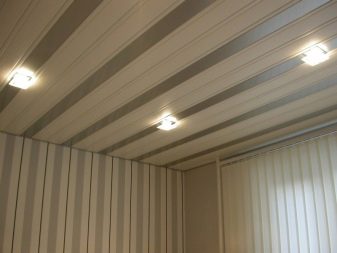
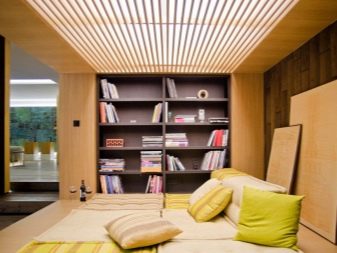
Drywall. This is a plastic material that allows you to create a perfectly flat ceiling covering or fancy volumetric shapes dictated by modern trends in design. There is no "greenhouse effect", and therefore this material is more environmentally friendly. With its help, it is easy to eliminate strong differences between the ceiling tiles, and the finished ceiling can be used both independently and as a basis for painting, upholstery, wallpaper.
It should be borne in mind that repairs using drywall will be long and messy. The material itself is heavy, with poor fastening, cracks may appear on it.
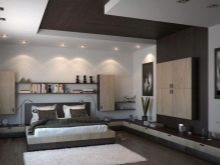
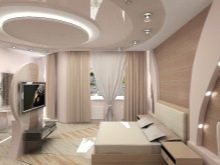
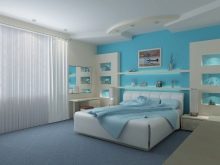
Ceiling tiles. Thin and almost weightless foam plates, which have a relief pattern on the front side, are a cheap and popular coating option. They are affordable (even colored models, mirror and glossy surfaces), easy to glue, hold securely. Ceiling tiles can be washed and, if necessary, replaced once.
If you are going to start gluing the ceiling with tiles, you will need to eliminate all the unevenness of the working surface.
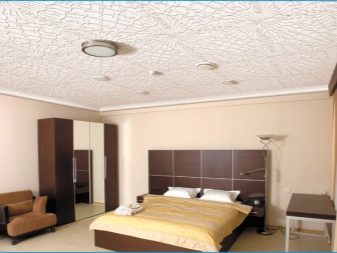
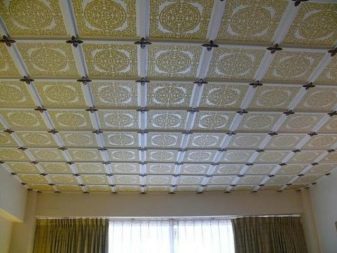
Wood. More expensive than all the others, an elite type of finishing. Can be used as a base coat or decorative (island).
It is very much in demand in modern "rural" interiors.
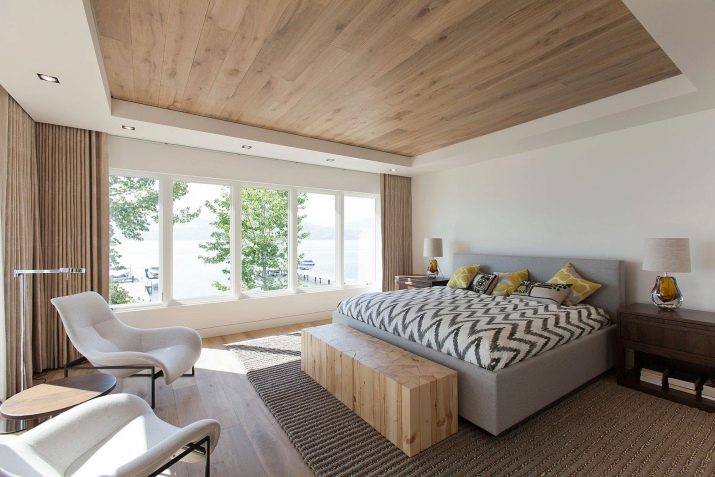
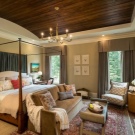
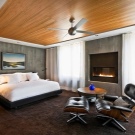
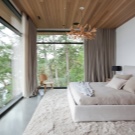
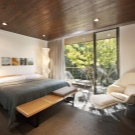
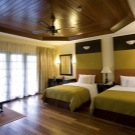
Ceiling wallpaper. Available in two versions: embossed white wallpaper with a wide choice of textures and options for coloring. Embossed wallpapers are available only in white and are produced by Russian manufacturers. They are difficult to maintain, but create a beneficial relief on the ceiling. Foreign wallpapers can withstand up to 10 layers of paint of different colors.
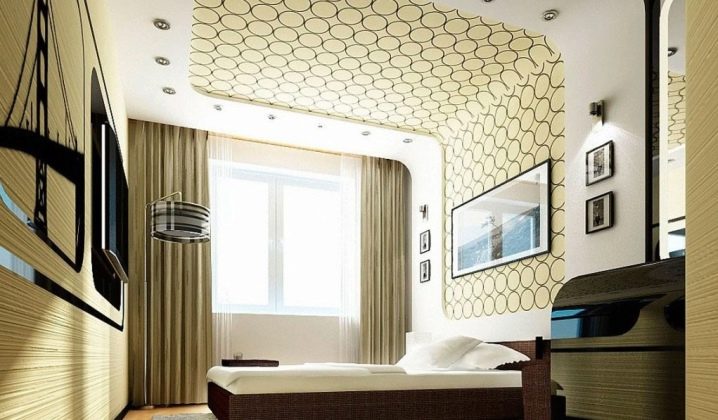
For walls
Walls take the most of the attention, since their dimensions are larger than the area of the ceiling or floor, they are at eye level. They form the basis of the style, so the choice of material for finishing is especially important. None of them are considered bad, but each has its own advantages and disadvantages that must be evaluated before choosing.
Traditional and time-tested finishes include painting and wallpapering.
Dyeing is an economical and easy-to-use method... It can be very different - from plain and smooth to textured and colored. With the help of paint, additional volume is created in the room, 3D drawings with perspective, original textured finish. You can use brushes, spray guns, stencils. You will have a high quality washable finish.
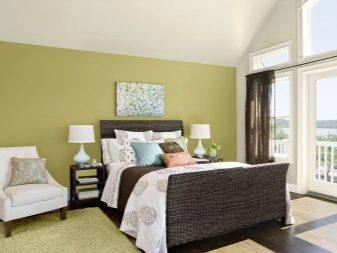
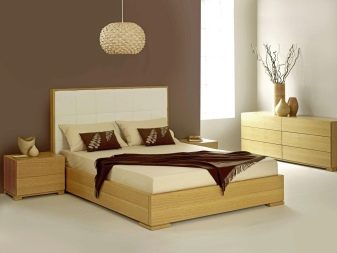
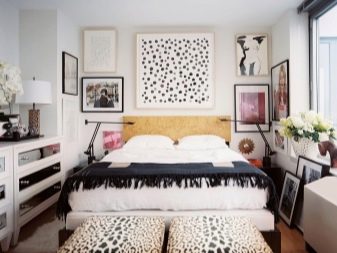
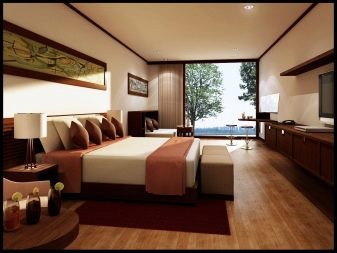
Wallpaper decoration is even more popular. Paper rolls are gradually becoming a thing of the past due to their impracticality. The types popular today are:
- Non-woven wallpaper made of fabric fibers and cellulose... They can be purchased both in color and for staining.
- High density vinyl wallpaper. Elastic, non-fading, washable material that adheres easily and has good performance.
- Glass fiber. Convenient and cheap material for coloring.
- The liquid wallpaper. The most modern type of finishing, the material is applied to the wall using a roller, like paint. After drying, no seams and joints remain, and the surface can be smooth or embossed, depending on the method of application.
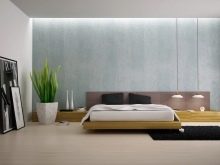
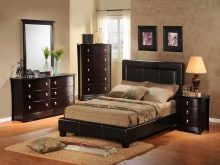
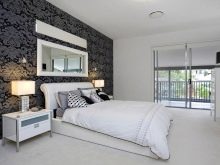
Wallpaper and paint are reliable, but they have become boring over the years. I want to make renovations in a modern bedroom more interesting and relevant, and for this there are other types of materials:
- Cork panels. They are simple, environmentally friendly, look beautiful on the walls, fit most modern styles, increase noise and heat insulation in the room.
- Decorative plaster... Durable, harmless, moisture resistant and non-fading coating. It is applied on all types of walls, without requiring preliminary surface preparation. With its help, you can mask defects, irregularities, cracks and create an interesting textured design of the walls. Imitation of amber, marble, malachite, the creation of stucco molding, the embodiment of the palace style - these are just some of the possibilities of decorative plaster for repair.
- Ceramic tile... This is reliability, high aesthetic qualities, environmentally friendly and hygienic material. The tile is popular among designers due to the variety of decor and color solutions, the ability to combine with any other materials.
- A natural stone. A stone on the wall is a bold decision in decorating a room. It can be large or small, flat or embossed, it depends on the size of the room and the desired effect. But such a surface looks very nice anyway.
When choosing a stone finish, you don't have to think about what to put on an empty wall. A textured pattern can be laid out with a stone, and the finish is completely self-sufficient without unnecessary decor.
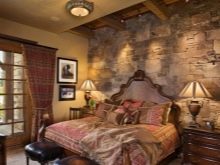

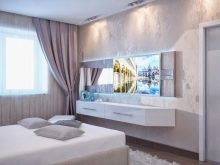
- Decorative panels. In fact, they are identical to stretch ceilings (in terms of their properties and installation principle). They can be colored, with photo printing, relief and additional lighting. Since panels are capricious with regard to high temperatures and moisture, in practice they are not very common.
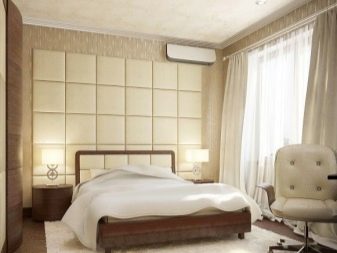
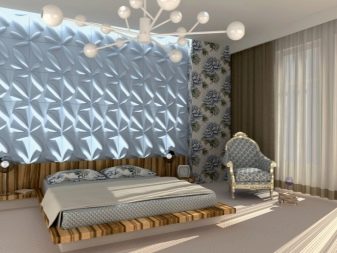
Many modern styles (especially creative solutions) use unconventional finishes:
- Brickwork or imitation. Looks good natural and paintable.
- "Bare" concrete walls a la "renovation has just begun." A good backdrop for wall decor and industrial styles.
- Double-glazed windows and glass blocks. Translucent colored walls used in studio apartments for room zoning.
- Wood. An expensive coating for eco styles and adherents of everything natural and safe for health.
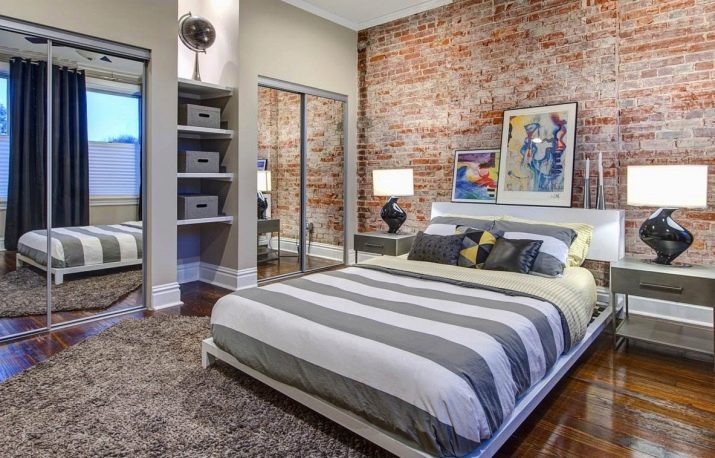
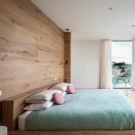
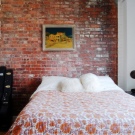
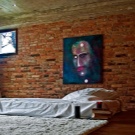
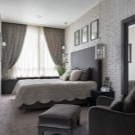
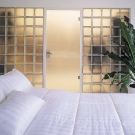
The bravest ones choose a short-lived, but original design.
The use of decorative plaster, stucco molding and ceiling rosettes on the walls belongs to the spectacular types of finishes “not like everyone else's”, which have not yet got bored. But "putting the house upside down" (using ceiling trim on the walls) is usually quite expensive, even if moldings are used to simulate stucco molding.
In this case, there is a budget solution - the use of old newspapers for wall decoration. Be careful with the choice of edition. Advertising greenhouses or hiring employees will hardly decorate a room, but catchy headlines and beautiful portraits are exactly what you need.
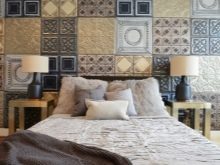
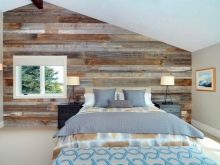
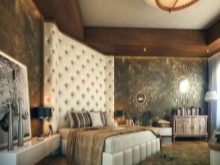
If you want something more practical, the solution will be OSB panels, eco-leather upholstery, plastic panels with LED backlighting, flexible stone.
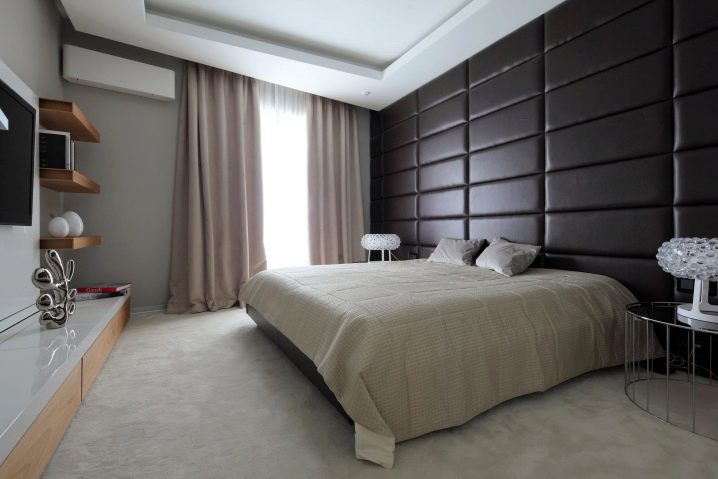
For floor
Comfort and convenience in the bedroom will be provided by a warm floor that is easy to clean and does not slip. The following materials meet these criteria:
- Linoleum. Economical, beautiful, durable coating. In a modern version, it can imitate more expensive materials.
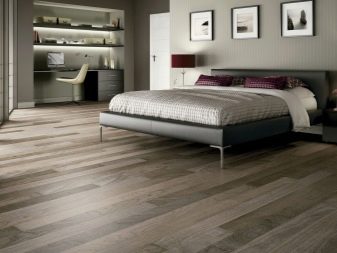
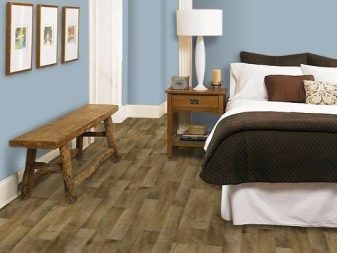
- Laminate. Aesthetic, practical, relatively cheap, easy to fit, comes in different colors. The coating is warm and pleasant to bare feet.
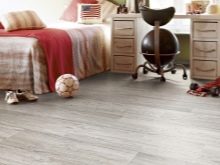
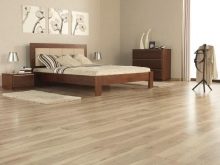
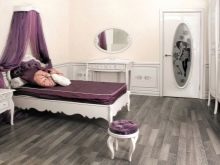
- Self-leveling floors. A difficult coating, but ideal from an aesthetic and practical point of view. It is beautiful, like good parquet, and pleasant to the touch, like rubber.
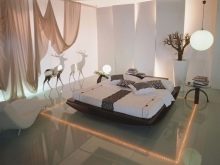
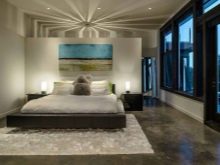
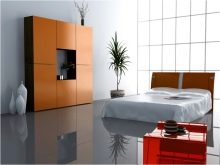
- Parquet... Prestigious finish from varnished wooden boards. The parquet looks beautiful, but does not have good wear resistance and is capricious in maintenance.
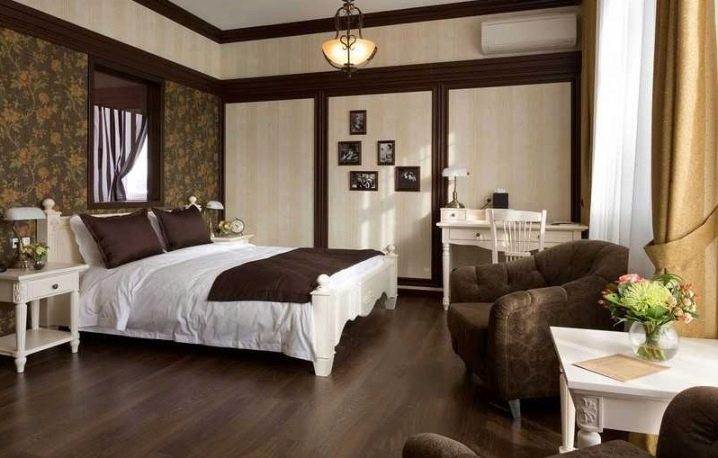
- Bamboo. Herbaceous flooring with wood imitation. It looks indistinguishable from parquet, but surpasses it in performance.
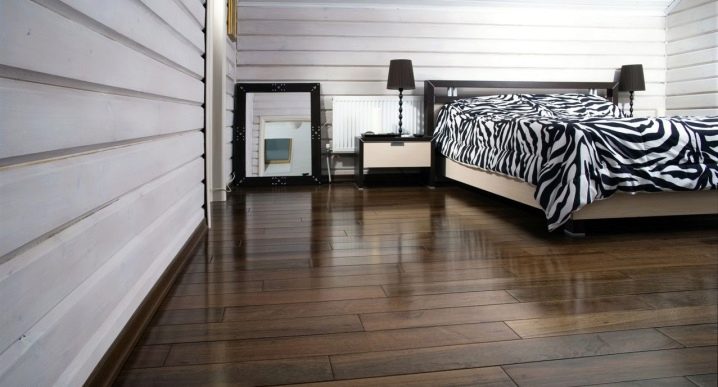
- Rubber... Durable, dirt, moisture and temperature resistant coating. An additional plus is excellent sound insulation. High-quality rubber must be produced in the West; its synthetic substitutes are toxic and unhealthy ..
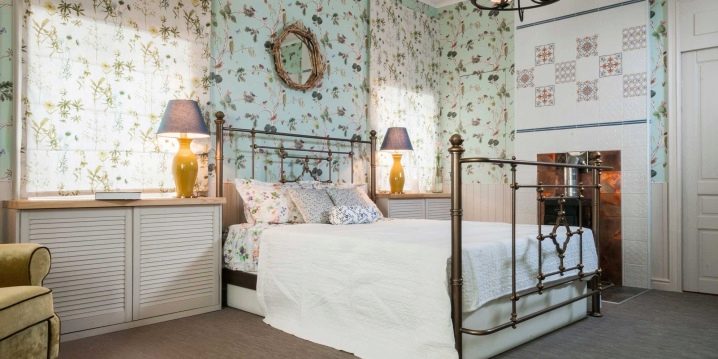
- Porcelain stoneware... A beautiful material that is "not afraid" of dirt, moisture and scratches. However, it should be noted that without heating the floors will be very cold.
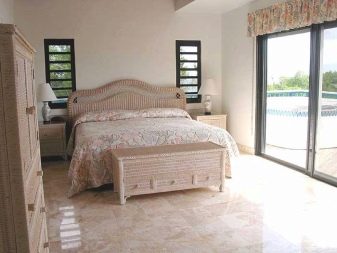
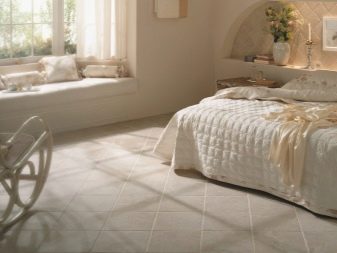
- Carpet. Warm, soft, pleasant to the touch floor, which also increases the level of sound insulation. It is easy to care for, but such a surface must be protected from the sun.
It is important to remember that design is not a quick choice of material, color and silhouette. It is a single whole, an ensemble that is formed by textures, colors, furniture and decor. With their harmonious combination, the interior acquires completeness and originality
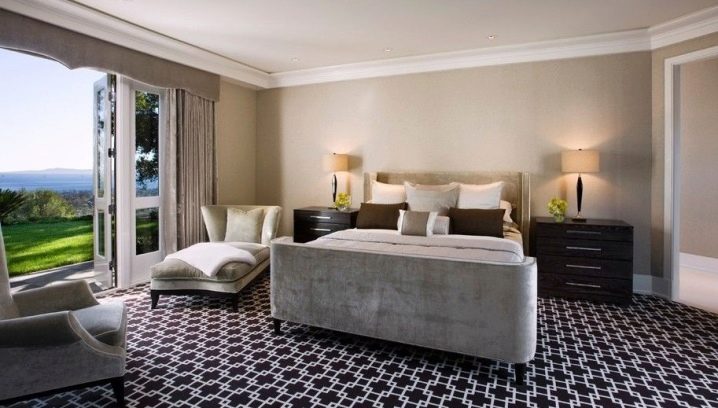
Arrangement Tips
How to make a bedroom cozy, practical and functional are the first questions that arise on the eve of renovation. At the same time, the stereotyped and traditional interiors have already become boring, and I want to be replaced by more creative and non-standard solutions.
A modern bedroom must retain the personality and characteristics of a personal space. The easiest way to achieve this is if you focus on gender, age, occupation and interests of the person for whom the room is being set up.
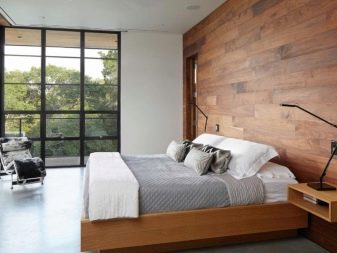
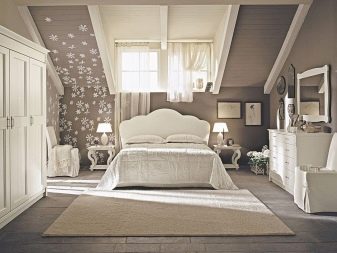
Children's and teenage bedrooms are usually a place for play, study and relaxation at the same time, so they need to be thought out especially carefully. It is important to properly zone the room, so that each activity has its own place, and to choose high-quality, safe and environmentally friendly materials for repairs and furniture.
It is very good if the child also takes part in drawing up the design project, then the room will definitely not seem boring and ordinary to him.
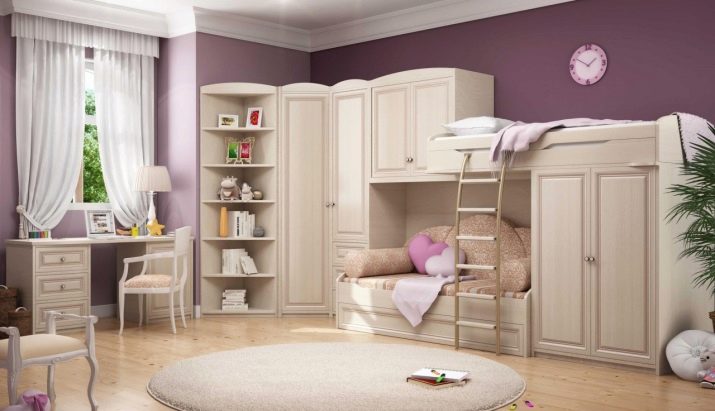
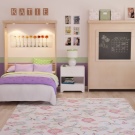
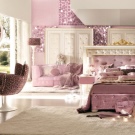
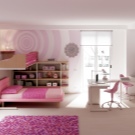
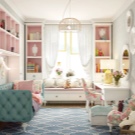
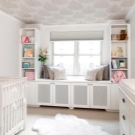
Single bedrooms can be male or female.
An "adult" room (as opposed to a nursery) combines the functions of a study and a place of rest. Less commonly, it is intended only for sleep.However, this does not mean at all that it should be banal. An interesting setting is pleasing to the eye and sets you in a positive mood anywhere, therefore, special attention should be paid to the design of a bedroom for an adult.
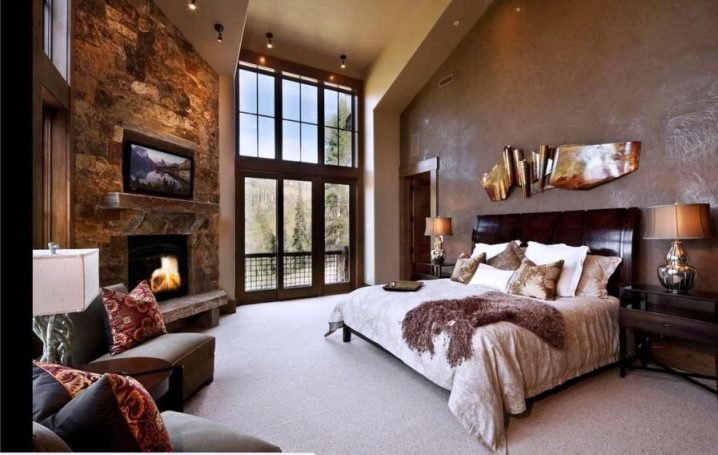
Women's bedroom is most often luxurious, light... It is necessary to equip it with a comfortable bed, a women's corner, a place to store things. The perfect bedroom every lady dreams of is a room with a built-in walk-in closet.
It is also worth considering an area for creativity, work or hobby. Lovers of reading will need a deep armchair and a bookcase, business women need a functional area with a computer desk, and needlewomen just need a sewing corner in the bedroom.
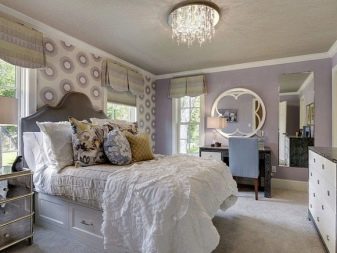
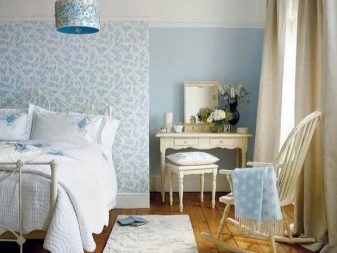
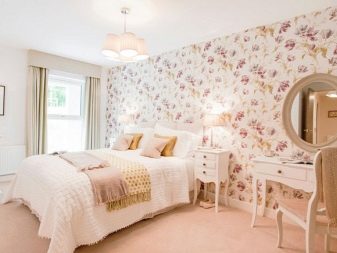
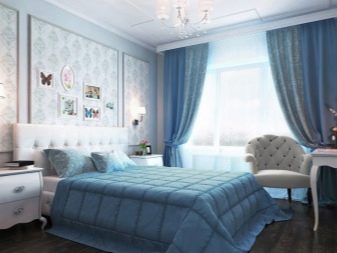
The men's bedroom can also serve as a place to relax and work.... It should be finished with materials that do not need to be looked after often, and furnished with only the most necessary items. Its characteristic features are simplicity, "brutality" and utmost clarity in the stylistic direction.
When zoning a room, representatives of office and technical specialties need to think over an area with a comfortable table and office equipment, creative individuals will need free space, as well as furniture that can be easily moved from place to place. Musicians should take care of high-quality sound insulation.
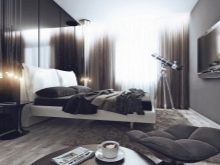
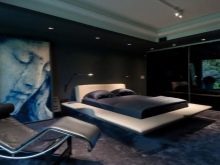
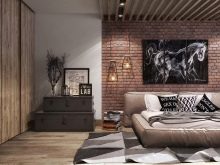
A double bedroom is a special occasion. The environment in her should be a compromise, uniting masculine and feminine features and retaining some intimacy.
The main role is given to a high-quality sleeping place, the width of which is at least 140 cm.
The type of premises is of great importance. It is one thing when it comes to arranging a bedroom in a small apartment, and quite another if repairs are planned in a private house or in a cottage. In an apartment, it is required to competently use the techniques of visually increasing the space, and in a house and a cottage it is worthwhile to intelligently approach the creation of an unusual layout.
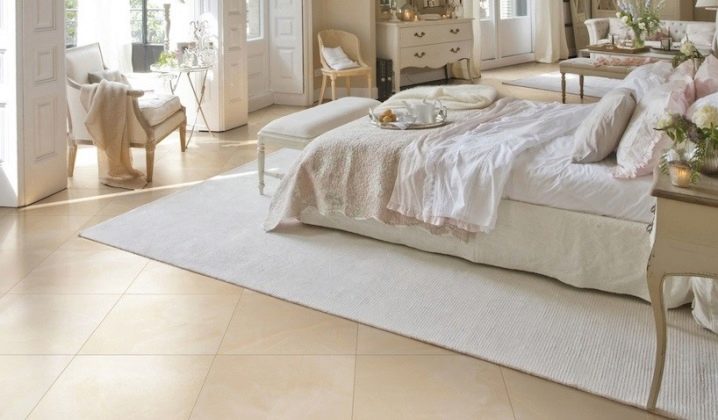
Popular interior styles and finishes
When it comes to historical or contemporary design, it is not easy to define the boundaries of a particular direction. However, this is possible if you take a closer look at their characteristics. There are three main directions - historical, ethnic, modern. They are divided into several more areas.
Historical style includes antiquity, avant-garde, art deco, empire, baroque, Victorian, gothic and romantic styles, classicism and neoclassicism, constructivism, renaissance, modern, rococo, eclecticism. It requires large areas, a developed sense of taste, as well as measure, an understanding that historicism is not a museum setting. Given these nuances, it will not be difficult to recreate luxurious romance, respectability and severity of bygone eras in your own home.
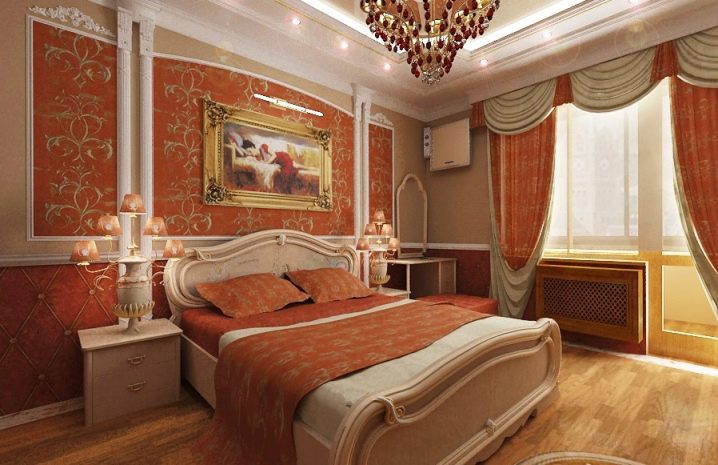
Antique (Greek) style
It is rooted in deep antiquity, but at the same time it is quite popular today. Its basis is refined luxury. Distinctive features:
- Greek symbols and ornaments. Motives of winemaking, flora and fauna, geometric shapes in the design of the floor and walls are welcome. Mosaics, frescoes (can be replaced with paintings on the walls), interspersed with marble, columns and arches look authentic.
- Symmetry and straight lines.
- Light-colored walls with a bright accent in the form of a pattern or tapestry.
- Soft lighting simulating the light of candles and torches, light cornices, wall lamps of non-trivial shapes.
- Upholstery with fabrics, curtains, carpets, artificial animal skins.
- Massive low-rise furniture.
- Light doors.
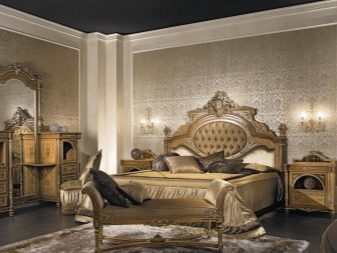
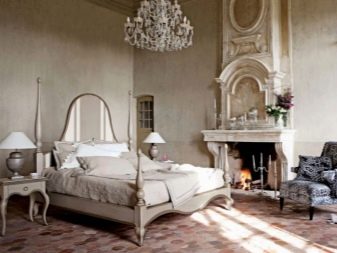
Vanguard
The style has a self-explanatory name, which implies revolutionary changes in the twentieth century - in the well-established ideas about the "correct" design of the premises. It is characterized by:
- Bold color combinations and contrasts.
- Unusual silhouettes, broken lines, expressive contours of furniture and walls.
- Unusual symmetry: a living plant in a pot duplicates its image on the wall.
- Decorative materials for decoration: suspended ceilings, gloss, liquid wallpaper.
- Furniture of non-trivial forms, concentrated in the center of the bedroom, and functional built-in furniture.
- A large number of artificial lighting sources.
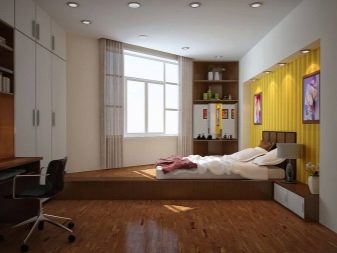
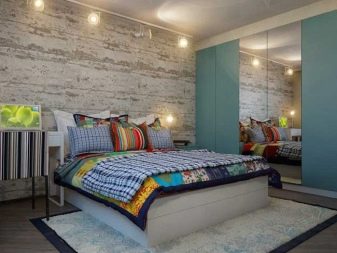
Classicism
An embodied aristocracy characterized by elegance, restraint and minimalism. The handwriting of classicism is noticeable in the following elements:
- The decorative character of the decoration of the room and furniture: painting, stucco molding, parquet, noble types of wood.
- Clear relief and bulky items.
- The presence of large mirrors.
- The central element on which all attention is focused. In the bedroom, this could be a four-poster bed.
- Squat, solid furniture with impressive curly legs.
- Cream, beige, greenish and brown shades.
- Fireplace and good lighting.
- Typical accessories: vases, sculptures, flowers.
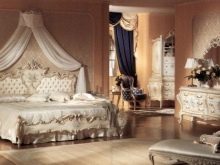
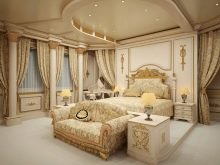
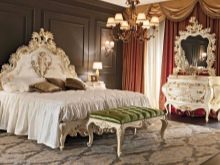
Neoclassicism Is conservatism. Minimalistic and luxurious semi-antique interior items are made of modern materials, and this is the main difference from classicism.
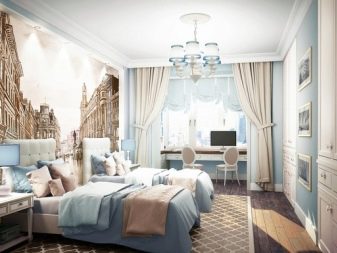
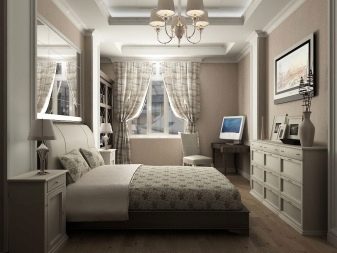
Modern represents the most "epochal" style, extravagant, pretentious, combining technological effectiveness and "decoration", forever remaining in the stage of active transition from established forms to new ones. Its successor is art deco, it is distinguished by more modern options and bold, but not chaotic, combinations of objects from different directions.
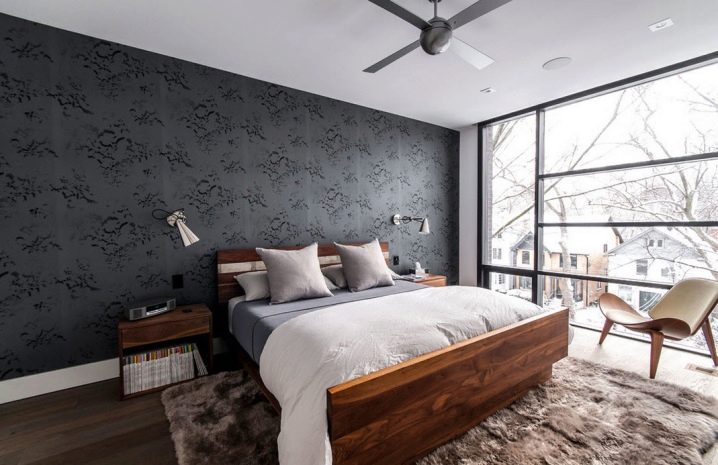
Empire style - respectability and elitism, requiring large areas for massive furniture with curly legs. Baroque and Rococo - multi-tiered, pomp, pomp, a tendency to excesses, characteristic of palace interiors. The most beautiful by the standards of the time, chic and expensive things are the basis of these styles. Renaissance and Victorian style are close to royal standards.
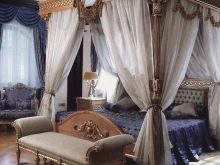
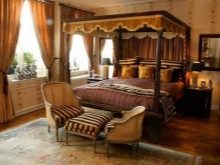
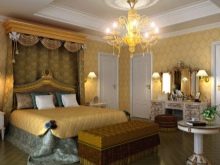
"My home is my fortress" - this is the credo Romanesque and Gothic styles, with their solidity and monumentality, dark palette and rough materials. In part, it has something in common with constructivism, in which everything is called by its proper name. A chair is a chair, it is only a functional piece of furniture, and non-functional items are not used.
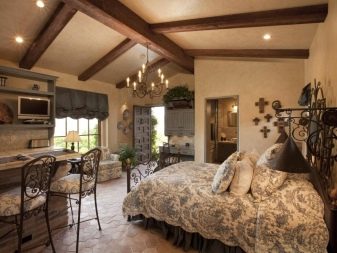
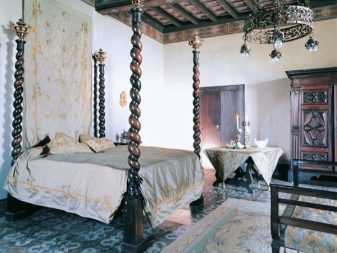
Expressionism - this is a creative attempt to absorb the features of all spheres (from theater to cinema), while deforming the usual forms, turning housing into a stage for everyday everyday performances. And at the junction of all styles is eclecticism, skillfully combining the best of them.
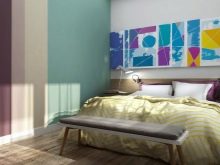
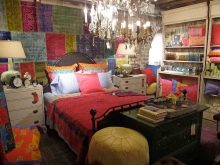
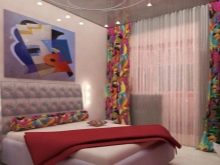
Ethnic styles have truly unique personalities. English has the features of pedantry and cozy stiffness, African and Moroccan reproduce the scorching sun, dry grass and cloudless sky in the colors of yellow-brown, terracotta, brick and blue shades.
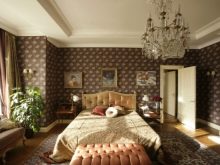
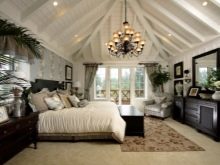
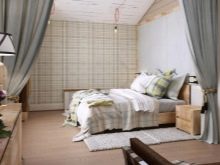
Oriental (including Chinese and Japanese) brings together all the elements of the identity of Asian peoples. The oriental style is good for the bedroom in that it is not very typical for Asian culture to flaunt the circumstances of the household, so the room will turn out to be cozy, fabulous and very intimate.
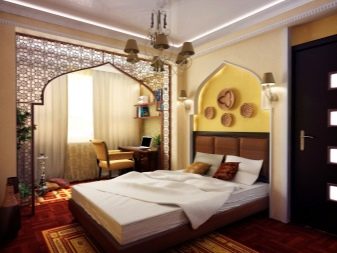
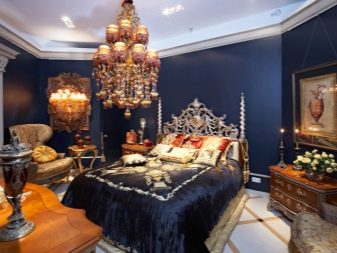
Egyptian the style evokes persistent associations with the pyramids and pharaohs, and the pyramids are symmetry, clear geometry, columns and characteristic symbols, extensively decorated with gold, draperies and interesting accessories.
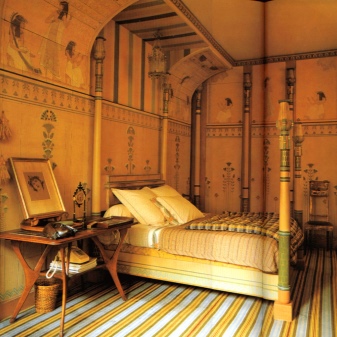
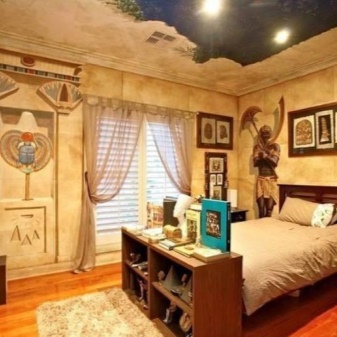
Indian the style combines the asceticism of poverty of the lower strata of the population and the luxury of wealth of the upper castes, Mexican is replete with national flavor, mixing material culture with European ideas of convenience.
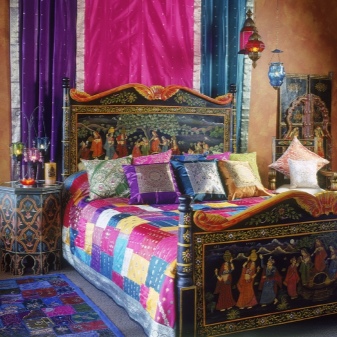
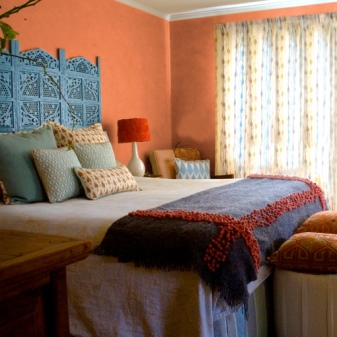
Scandinavian the style is built on simplicity and contrast of functional structures and decor. Mediterranean - these are laconic volumetric things, often handmade and made from natural materials, bearing traces of the cultures of Greece, Turkey and Italy. This style is conducive to relaxation and detachment from the bustle of everyday life.Tropical style echoes it.
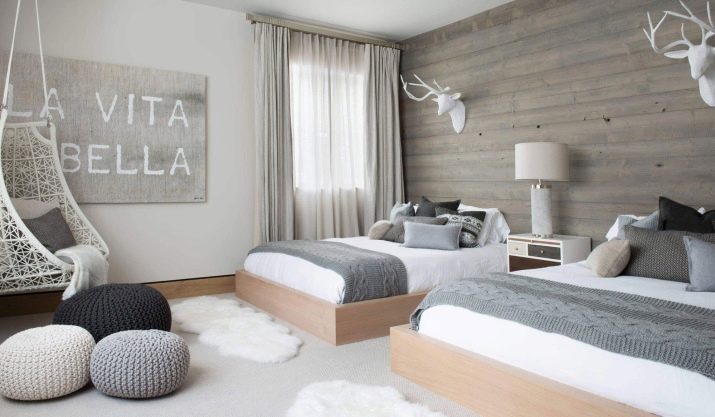
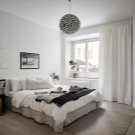
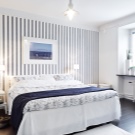
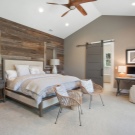
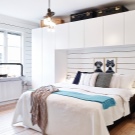
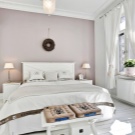
Russian style is by no means a jumble of ethnic souvenirs (like a nesting doll and a samovar). This is an abundance of wood in decoration and furniture, the obligatory presence of textiles, a beautiful chest of drawers or chest, a fireplace or its imitation, a minimum of souvenirs, especially foreign ones.
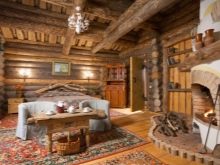
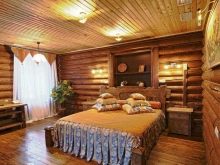
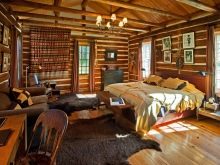
American style is flexibility and democracy, complete freedom for self-expression and demonstration of preferences.
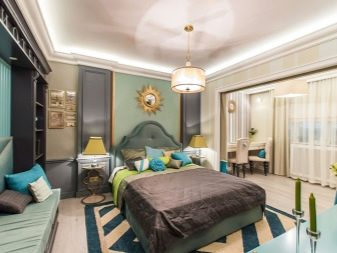
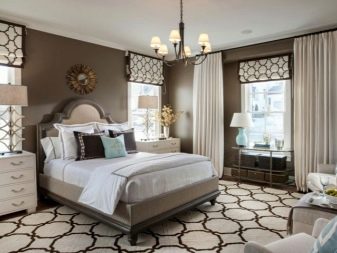
Provence with a touch of bourgeoisness, "with history", an abundance of light and soft shades, it is closest to modern trends.
Popular modern trends are focused on the design of premises without the use of pretentious furniture, expensive materials and decor in abundance. They focus on simplicity, functionality and free space. Among them, there are more than a dozen directions, and some of them deserve special attention.
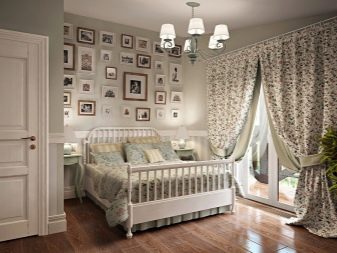
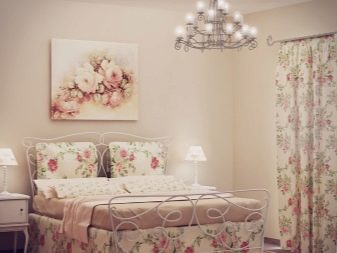
Grunge
This is a democratic combination of modernity and antiquity, a demonstration of elegant, solid things and materials, chosen with taste. Furniture in the style of classicism is deprived of gilding and carved patterns, marble floors are replaced by a more practical and affordable varnish. Curtains with a lot of pleats are lightened into curtains made of translucent flying fabrics. Among the distinctive features are especially striking:
- Laconic but massive items.
- Fake high cost or imitation of noble materials.
- Abundance of natural fabrics: linen, cotton, silk.
- Antiques, antiques, vintage items.
- "Hereditary values" in the form of bronze figurines, candlesticks, mirrors.
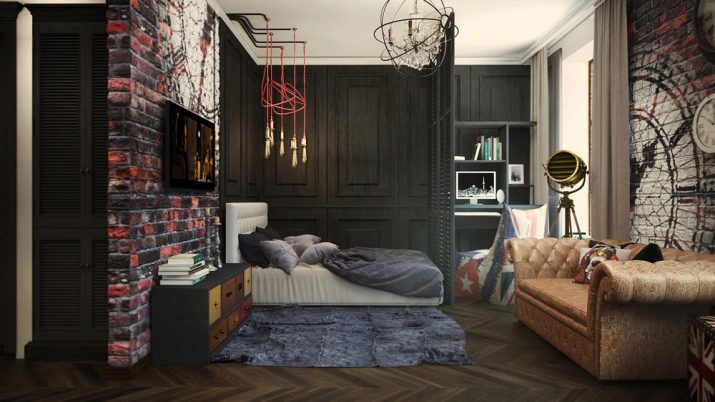
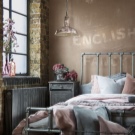
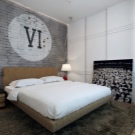
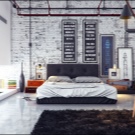
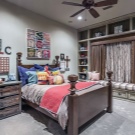
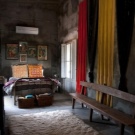
Contemporary
Youth style, in which everything is done without frills. They say about this "simply and with taste." At the same time, a pleasant and comfortable room for life can be diluted with a new object at any time, as if continuing the unfinished composition of the situation. This makes the contemporary style dynamic and somewhat eclectic. Specific traits:
- Easily movable furniture (modular, transformable, on casters, folding).
- Every thing is functional.
- Space saving due to compact arrangement of items.
- The presence of bright, catchy, memorable accents.
- Hints at the presence of elements of extraneous styles.
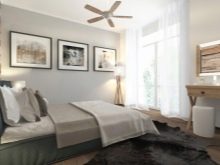
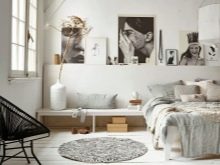
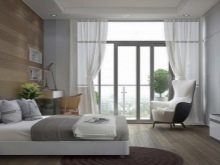
Fusion
Concentrated creativity for those who don't like the mundane, boring and traditional.
However, the expressiveness of the style is achieved more by contrast and the effect of surprise than by a general pile-up of bright elements. So, for example, a fusion-style bedroom can be decorated with one floor vase - if it is not a ten-liter transparent bottle, but occupies the entire space from floor to ceiling (a bright spot in the corner of the room).
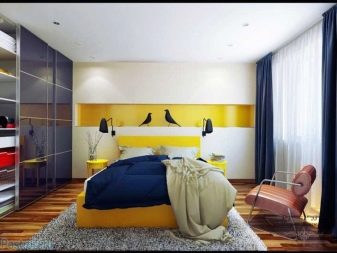
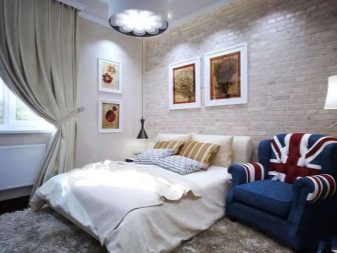
It is easy to define fusion among other styles by its inherent features:
- Maximalism and extravagance of the environment. If accessories, then bulky, if chic, then striking.
- Expensive jewelry, because we are talking about designer products.
- A mix of elements from different styles: an academic Renaissance painting and a poster of a youth rock band next door.
- Bright palette, interesting color combinations.
- Expressive texture of materials.
- Bohemian.
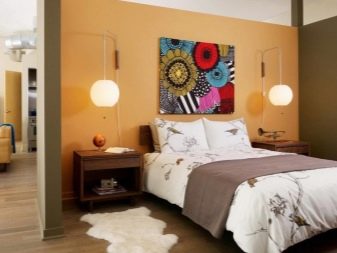
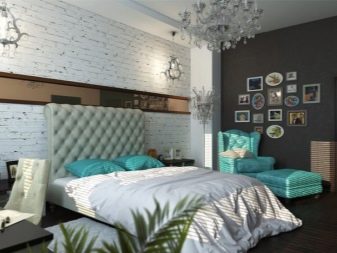
Loft
Loft is a favorite youth style that has many incarnations (from orthodox industrialism with a touch of creativity to a distant reminder of them - using modern materials). The signs are as follows:
- Carelessness of the furnishings: "uninhabited" premises, mobile objects that are easy to move around the room, imitation of repairs at the final stage.
- An abundance of light shades and natural light.
- Rough and natural textures in the decoration of the bedroom.
- Floor-to-ceiling windows without curtains.
- A combination of old and new, expressed in the neighborhood of a wooden bed with new appliances.
- Industrial features: rough furniture, exposed wiring and plumbing, metal surfaces and ceiling beams in plain sight.
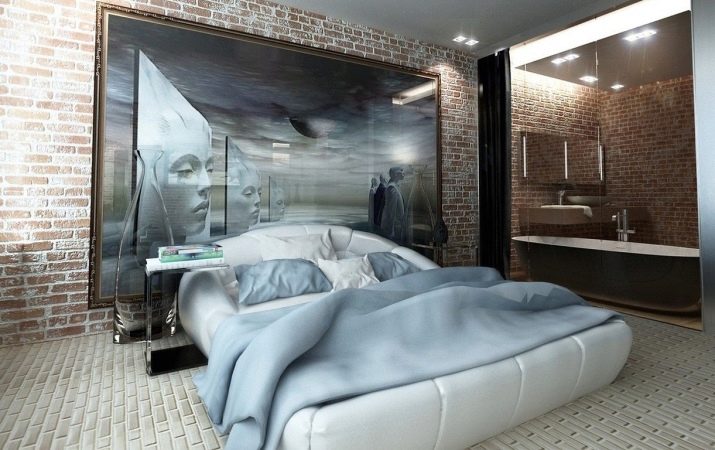

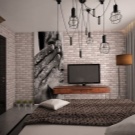
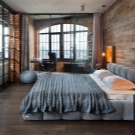
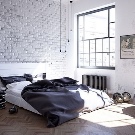
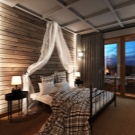
Pop Art
Fashionable, bright, energetic design, which is assembled from everything that can come to hand in the store. Popular consumer products are transformed into works of art, and real works of art that are out of the ordinary are cultivated and take center stage in the composition. Design Features:
- The predominance of synthetic materials.
- Cheap accessories: grossing movie posters, plush heart pillows, and a distinctively faux animal hide.
- Placing the same items at different levels.
- "Pop" decor items: an advertising poster for "Coca-Cola", a sketchy portrait of a Cuban revolutionary.
- Carpets and rugs in different sizes, textures and colors.
- Furniture made of plastic or eco-leather.
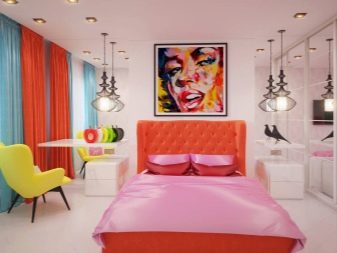
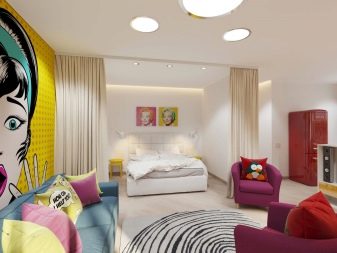
Stylish solutions in the spirit of "bungalows" and "chalets are widespread"- with original comfort and romance, surrounded by natural materials. Eco style is popular, minimizing the importance of the latest technologies in modern life. They are close in spirit to romantic shabby chic, urbanized country country, freedom-loving and cozy boho.
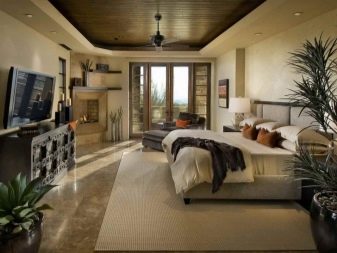
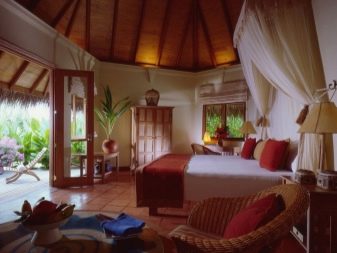
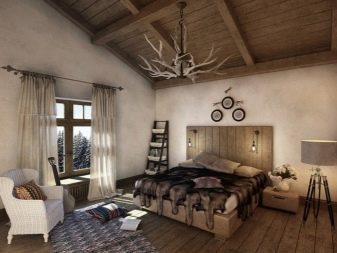
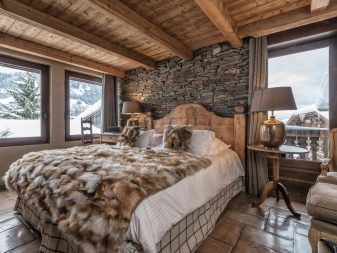
Postmodernism is intended for creative individuals, vintage - for connoisseurs of beauty from bygone eras. They are opposed by ultra-modern high-tech, cultivating the development of digital technologies and gadgets to improve life, techno with a predominance of geometric shapes and polymer-chrome surfaces.
For those who do not like to rush from one extreme to another and are on the border of a creative and technological boom, there is a beautiful, functional and maximally unloaded minimalism.
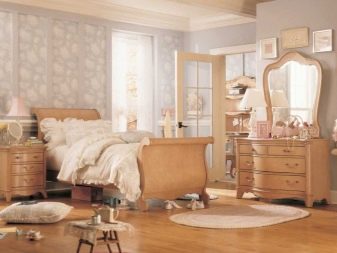
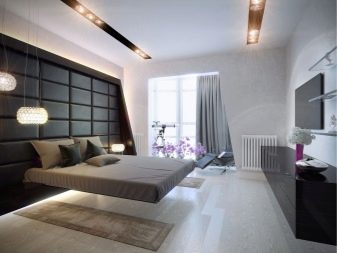
Designers advise using universal tips for decorating a bedroom:
- Choose a specific style as a guide.
- Create a design project based on computer programs, ready-made samples or the help of a specialist.
- Choose a color scheme that is pleasing to the eye.
- Consider placing the work area next to a source of natural light.
- Find the best way to zoning a bedroom (lighting, color, podium, screen, furniture arrangement, rugs).
- Use space optimization techniques in small rooms.
- Calculate the required width of the berth - by the number of sleepers.
- Carefully choose the right orthopedic base and quality bed.
- Provide access to the double bed from both sides.
- Consider the type of storage system and bedding.
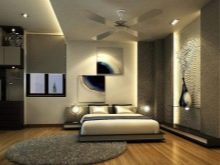

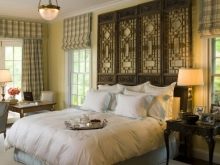
Color solutions
New technologies and modern building materials have replaced traditional solutions in the choice of colors for finishing ceilings, walls and floors. Now the palette depends only on the preferences of the owners, and the right choice is based on the recommendations of experts in the color design of the bedroom.
White color remains a favorite of many designers as it is a versatile "partner" for any other color and a backdrop for bright accents. Moreover, blotches of colored elements on a white background do not look scattered, they are combined into a certain composition. This color is universal for finishing the ceiling and walls (with different materials), but for the floor, you should choose a more practical option.
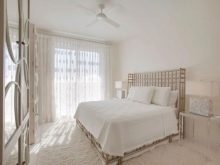
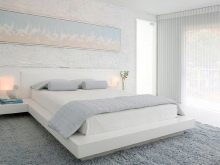
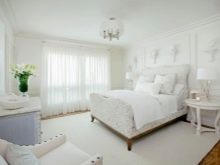
Close to white milky color. This warm shade is intended for cozy interiors in historical styles, and for more modern ones, a cool, "signal" white is suitable.

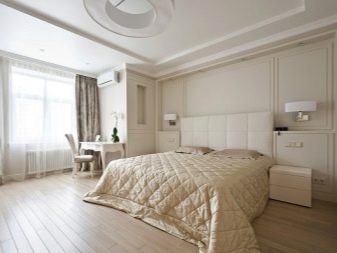
Looks original and self-sufficient powdery color. It is deep, soft, and is great for monochrome performances as well as combining with brighter elements.

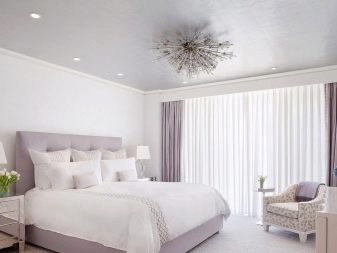
A delicate palette is appropriate in the bedroom, conducive to relaxation and tranquility.
The decor is relevant for the rest room in peach tones. Cream, linseed, olive, pistachio, light green, mint bases are suitable for a large number of interiors recreated in the bedroom.So that the monotony does not seem impersonal, it is worth adding juicy color accents: plum, coral, gold, coffee, emerald, terracotta, cherry.
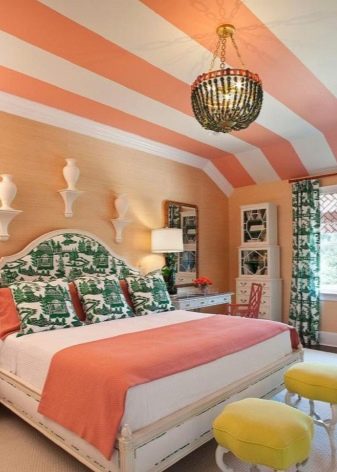
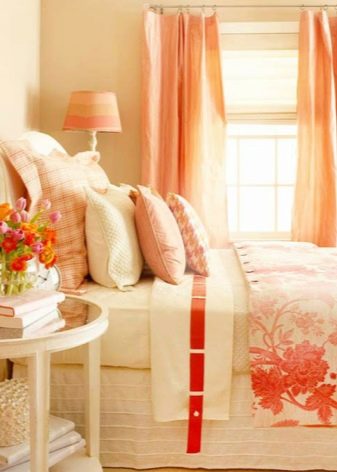
Psychologists claim that green palette in a combination of different shades is the most soothing and pleasing to the eyes and the nervous system. It will not be too boring and simple - and at the same time, it will not irritate or bore you for a long time. Dark greens go well with white, golden, brown, wine, African wenge. Burgundy and lilac are successfully combined.
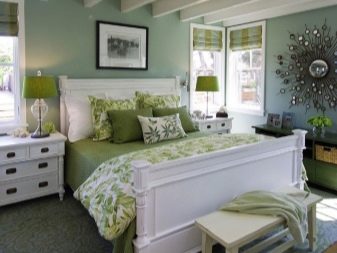
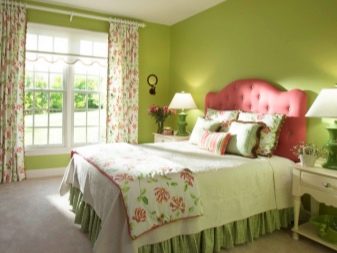
Fresh and modern look combinations of bright, but not flashy colors: yellow clay and Prussian blue, creamy and amber, creamy and plum, sunny yellow and heavenly, pear and sangria, lemon cream and precious stones (emerald, sapphire, ruby), honey and cinnamon.
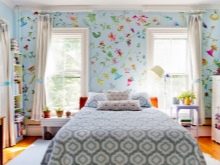
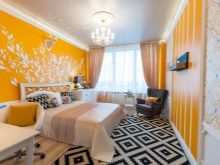
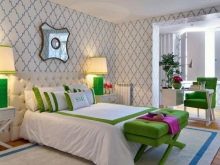
Don't be afraid of dark colors... Cool tones of blue, brown and gray will make the bedroom modern and unusual, and not at all gloomy.
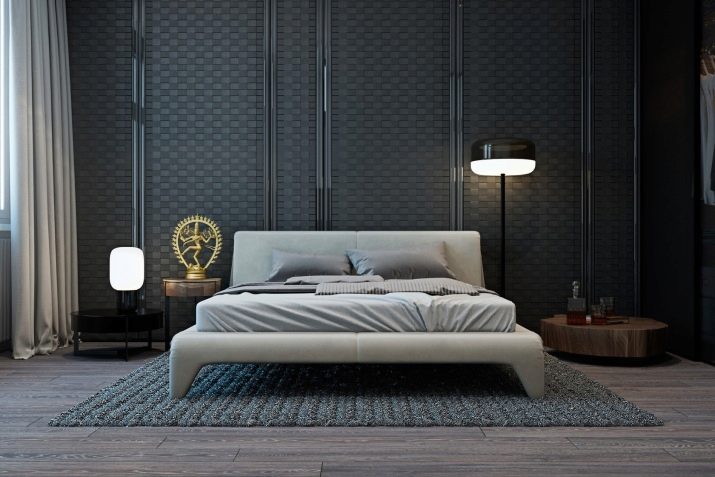
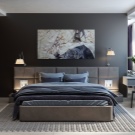
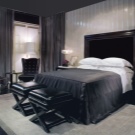
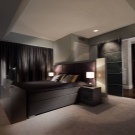
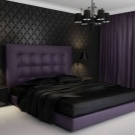
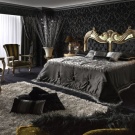
Selection of furniture and accessories
Regardless of whether you are planning a budget redecoration or a luxury renovation, the primary task is to think over the furnishings of the room to the smallest detail. Not everyone can immediately figure out how to furnish it, how to decorate it, where to equip this or that functional area.
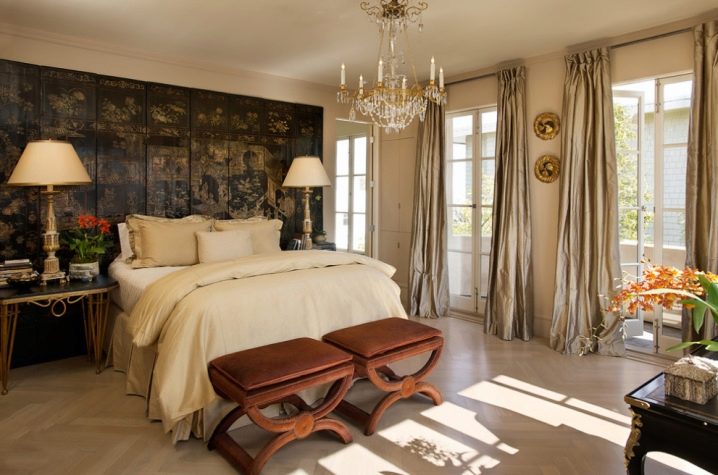
The appearance, dimensions and functions of the furniture determine the style in which the interior of the room is made. For historical styles, elite furniture, of high quality and durable, is more suitable. Ethnic or colonial style demands something authentic and recognizable, while modern trends can afford everything, including designer products and handcrafted furniture. However, this is not the only criterion. There are other useful "cheat sheets" for choosing furniture:
- Consider the purpose of the room. In the bedroom, which is used only for relaxation, the main place is reserved for sleep, and therefore a large and comfortable bed can occupy a significant part of the room. For the study bedroom, more compact sleeping systems are needed, which are transformed in the daytime and do not take up much space.
- Choose a bed or sofa with a sturdy frame and orthopedic base. Fittings and transformation mechanisms must be in perfect working order.
- Give preference to environmentally friendly and safe materials.
- Take into account the height, weight and number of sleeping people, take into account the norms allowed in the instructions, otherwise the product will quickly become unusable.
- Do not purchase one and a half and double beds already 140 cm.
- If you have a choice, give preference to built-in rather than cabinet furniture.
- Observe the measure. All non-functional things are a waste of money and free space.
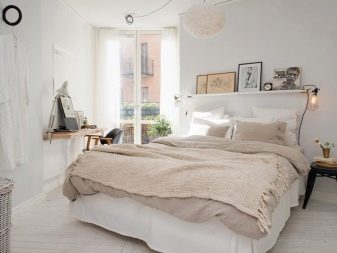
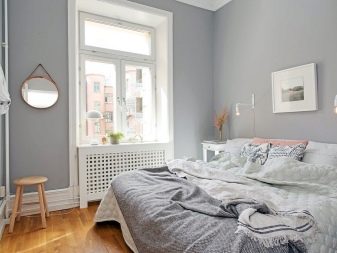
Accessories
Thinking over the interior, each owner thinks about how to decorate the room, what to hang on the wall, how to decorate the window, what accessories to choose. The answers to these questions are laid down in the characteristic features of a particular style, but there are also universal design options that are appropriate in most cases:
- Paintings. The direction in art to which the picture belongs depends on the style prevailing in the interior. The decoration of the canvas with a simple wooden frame looks beautiful, a good option is a baguette made of wood, plastic or aluminum.
It is worth paying attention not only to the usual pictures, but also to collages, panels, mosaics and patchwork.
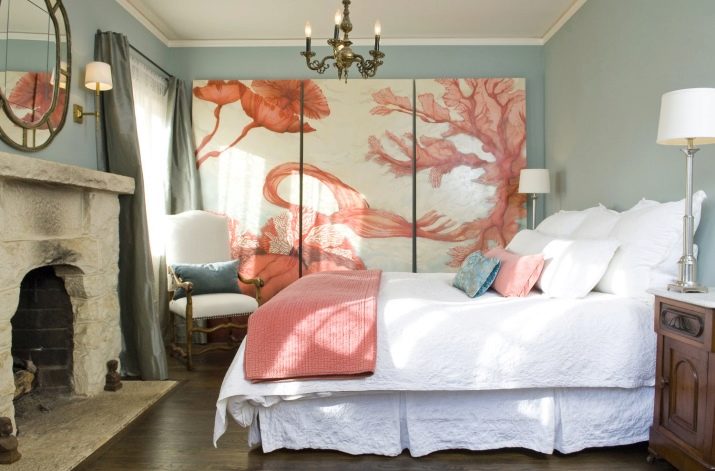
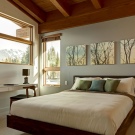
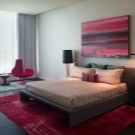
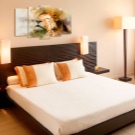
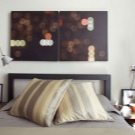
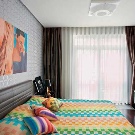
- Photo. A famous photographic job or a beautiful family photo will make the atmosphere in the bedroom more homely and warm. Posters are appropriate in the youth bedroom.
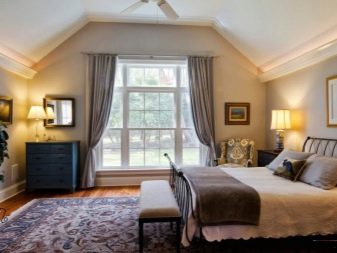
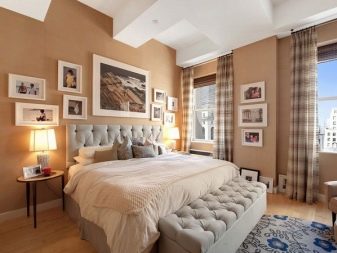
- Drawings. Landscapes on the walls with 3D effect and perspective, painting on the wall instead of canvas, and any other image will add personality to the room. You can apply a drawing with your own hands using spray paint and stencils.
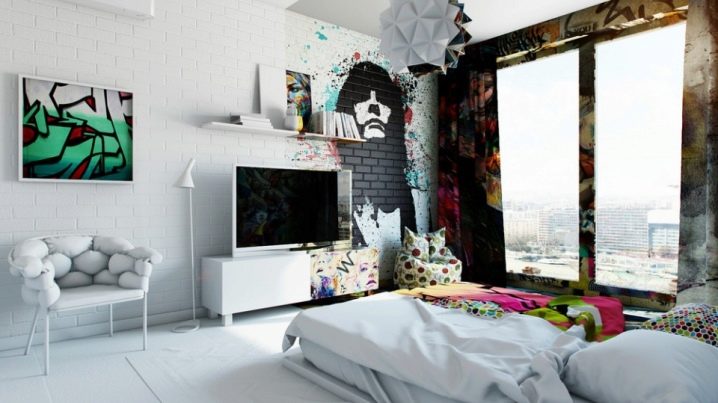
- Handmade. Handmade things help to create an original atmosphere: knitted blankets, lamp shades, souvenirs.
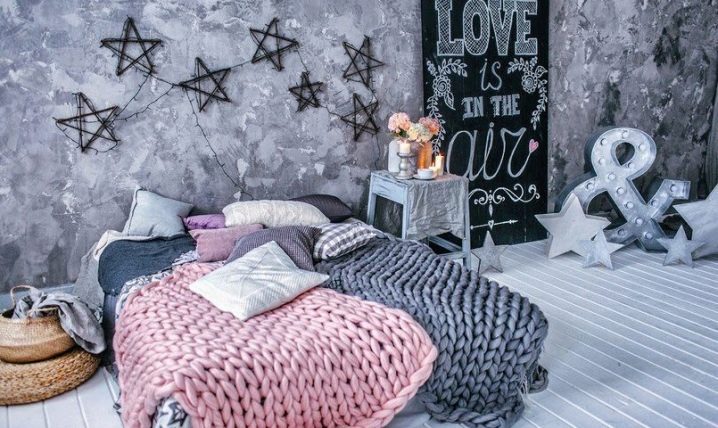
- Textile... Soft accessories (curtains, curtains, canopies, blankets and bedspreads, pillows) make the bedroom cozy.
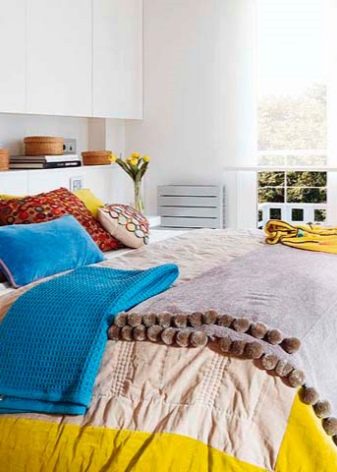
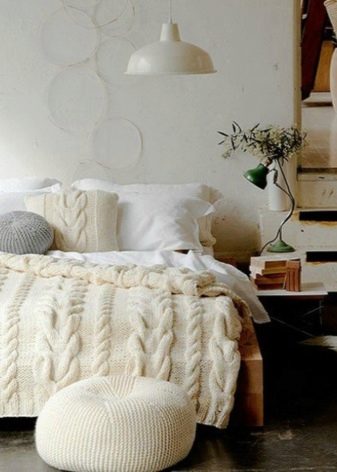
- Antiques and vintage... Grandfather clock, "grandmother's" floor lamp, decorative chest and other attributes of the past years are appropriate in most styles, they make the design more interesting and "expensive".
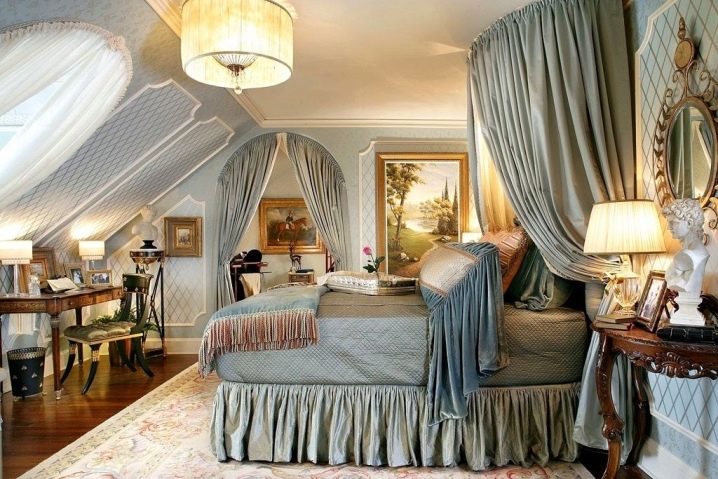
- Carpets and bedside rugs... They not only complement the interior, these products are practical if the floors are not heated.
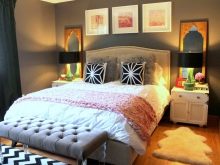
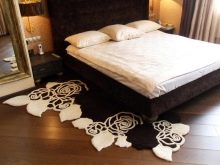
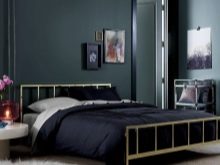
- Light fixtures... Artificial lighting plays a special role in the setting. A decorative lamp is good in itself and for creating additional volume and highlighting areas in the room. An electric fireplace or a large aquarium with original lighting looks great as a light source.
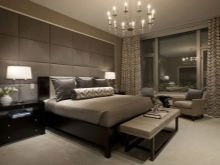
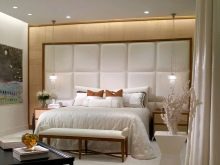
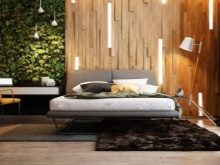
- Associated furniture. The bed in the bedroom is rarely enough. Someone lacks a chest of drawers or a cabinet, someone needs hanging shelves, and someone needs a whole bench for the full value of an interior in the Russian style. The main thing is not to overdo it when making up a furniture ensemble.
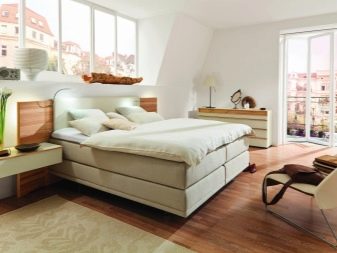
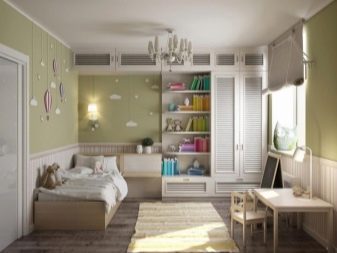
- Moldings - decorative strips for finishing any surfaces, giving them a more complete look.
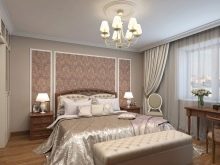
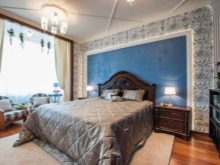
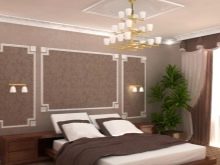
- A designer highlight for complex interiors.
In a studio apartment, movable partitions may be needed so that the kitchen, bath, shower and toilet are isolated from the bedroom.
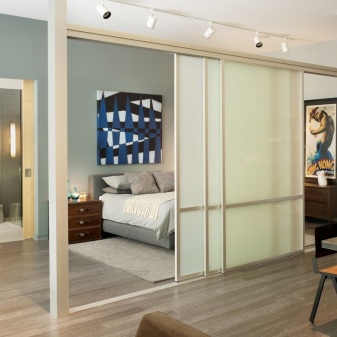
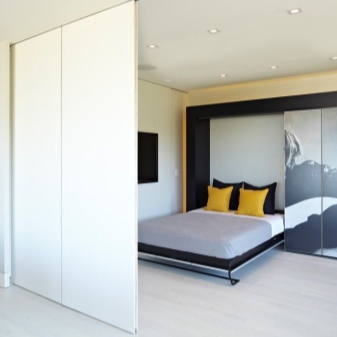
Lighting and bedding
Success lies in the details, and it's not just obvious accessories, but also thinking through the little things that create style.
Artificial lighting plays an important role in the interior of the bedroom... With its help, the space visually increases, the functional areas of the room are highlighted, and coziness is created.
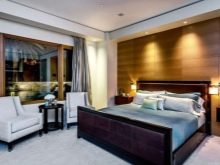
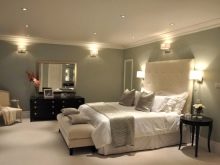
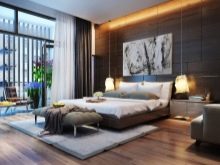
Space transformation techniques:
- Increase in ceiling height. It occurs due to the installation of lamps on the walls, the rays of which are directed upward. Such illumination visually raises the line of the ceiling.
- Narrowing of the "pencil room" bedroom. Placing a light source in the center of a room is a common mistake. The optimal solution for narrow and long rooms is the location of the lamps on one of the long walls or the L-shaped arrangement along the longitudinal and far narrow wall.
- You can lengthen a room just by placing the same lamps in one row in the center of the ceiling. This will create the necessary perspective.
- Changing the overall size of a room... The main trick is to create bounced and diffused light. The more reflective and glossy surfaces the better.
- Bedroom zoning... Local lighting near furniture, above the table, around mirrors or paintings delimits the space better than any other technique.
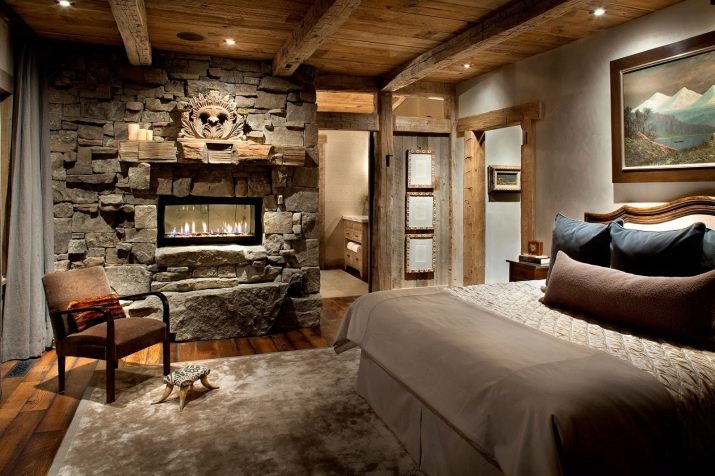
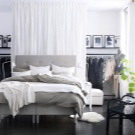
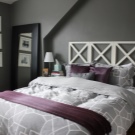
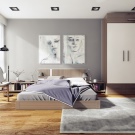
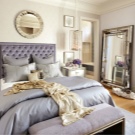
When choosing bedding, it is necessary to take into account their compliance with the color scheme of the interior, convenience, quality and naturalness of materials, and the season.
You can see even more bedroom design ideas in the next video.













Thanks for the helpful and interesting article!
The comment was sent successfully.